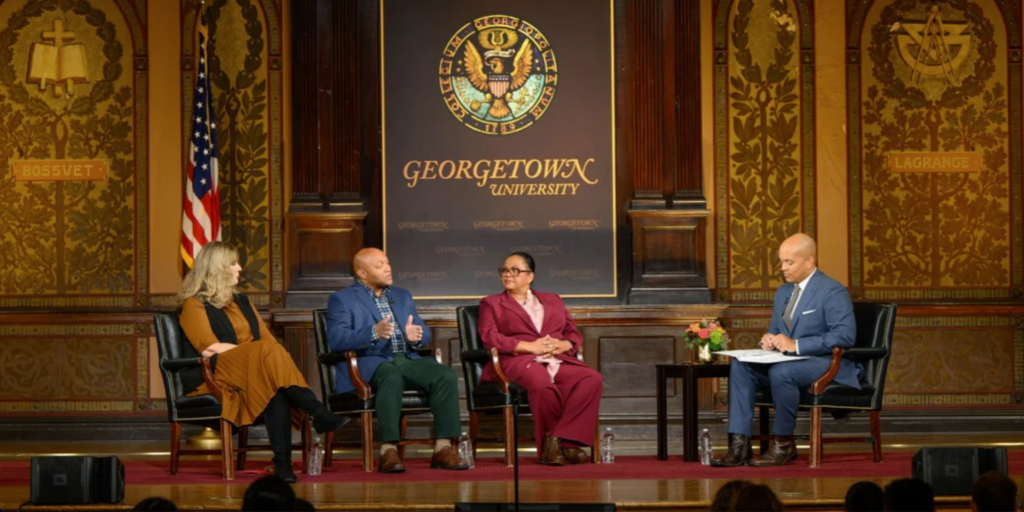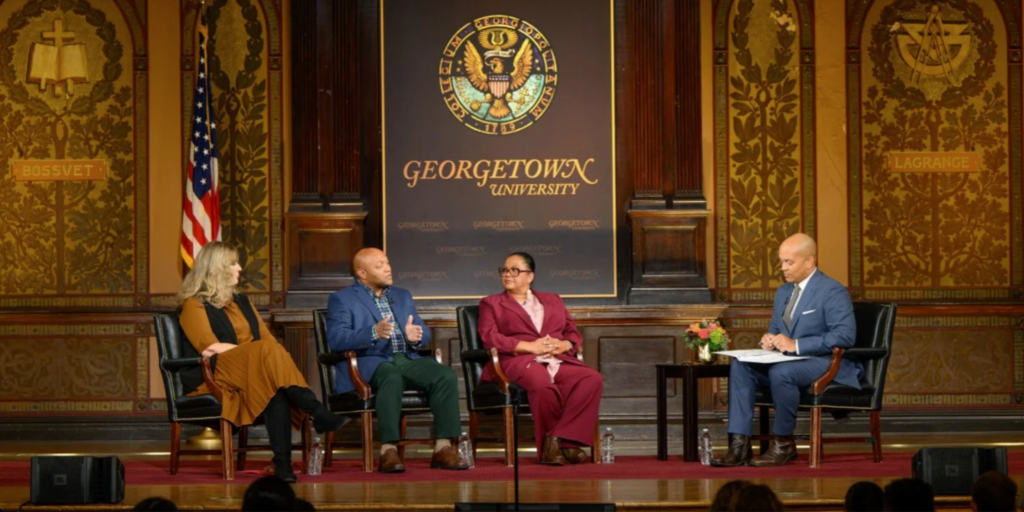PBS NewsHour and the Georgetown Prisons and Justice Initiative (PJI) hosted a panel in Gaston Hall on Oct. 10 to discuss the effects of incarceration on families as part of PBS’s “Searching for Justice” series.
Moderated by NewsHour anchor Geoff Bennett, the event featured three panelists: Tyrone Walker, director of reentry services for PJI and a former incarceree; Vonya Quarles, co-founder of Starting Over, Inc., a non-profit helping individuals in California successfully transition out of prison; and Lynne Haney, a sociology professor at New York University.
PJI is a Georgetown initiative founded in 2016 that focuses on connecting individuals behind bars with various career and education opportunities and resources.
The “Searching for Justice” series is a multi-media effort by PBS NewsHour to explore criminal justice reforms and discuss the issues relating to the legal system and mass incarceration. The panel discussion focused on the barriers people face when they leave prison. The panel examined factors such as family dynamics, employment, housing and economic stability.
Georgetown professor of government Marc Howard, the director of PJI, introduced the panel, commending Georgetown’s work to help incarcerated individuals.
“I truly believe no university in the country is doing more for people who have been impacted by the criminal legal system,” Howard said at the event.
Howard said that incarceration affects more than incarcerated individuals: families, especially children, often face economic, social and generational burdens.
“Despite the fact that almost half of Americans have an immediate family member who served some time in prison, the cultural stigma that persists around incarceration can make that experience extremely isolating,” Howard said. “Conversations like these help to break down the stigmas that alienate us from one another and they create more understanding about the very real effects of incarceration on our families.”

PJI Director of Communications Evelyn Rupert said that when discussing incarceration, it is important to discuss families, too.
“As we talk about mass incarceration, it’s important not to leave the family out of those conversations. It’s often said that families serve the time too,” Rupert wrote to The Hoya. “The incarceration of a loved one has a significant impact that can reverberate through generations.”
Walker said that for him, the prospect of reconnecting with his daughter gave him the motivation to keep living while in prison.
“Doing the long prison sentence and thinking that you’re going to die in that cell is death in and of itself. And so that was a relationship that I needed in those dark moments when I had those thoughts. I was like ‘Hey, I’ve got something to live for, I’ve got a letter to write,’” Walker said at the event.
2.3 million people are currently incarcerated and another 7 million are in the probation and legal systems.
Walker said this statistic proves that the legal system is not working to benefit individuals or society.
“How has that helped us? They haven’t proved that that has actually helped. That’s not serving humanity any good, and it’s definitely not serving society well,” Walker said. “When are we going to try other solutions to have a different outcome? Mass incarceration is proven not to work.”
Quarles, also a former incarceree, said that despite being able to reconnect with her children and form a relationship, her incarceration altered her family permanently.
“There are differences between the way I interact and relate with the adult children I didn’t raise, and we can never undo that. But I think just defying the odds and defying the system and loving regardless of those breaches or breaks in that relationship is important,” Quarles said at the event.
Haney said society needs to shift its focus away from avoiding recidivism, the tendency of a criminal to re-offend, and instead to actively helping former incarcerees become successful members of society.
“The goal is reentry and reintegration, not necessarily to avoid recidivism,” Haney said at the event. “The more profound question is how do we keep people integrated into familial, community, social structures that will ensure their own wellbeing and familial wellbeing?”
Quarles warned against narratives that increasing incarceration will cut crime rates and said that governments need to continue reforming the prison system.
“Prison does not work. And now we hear a lot of elected officials swinging towards going back to this law-and-order philosophy,” Quarles said. “We challenge those narratives and remember that there are people who aren’t that individual who are impacted, and how are we going to treat ourselves and our society better today.”









